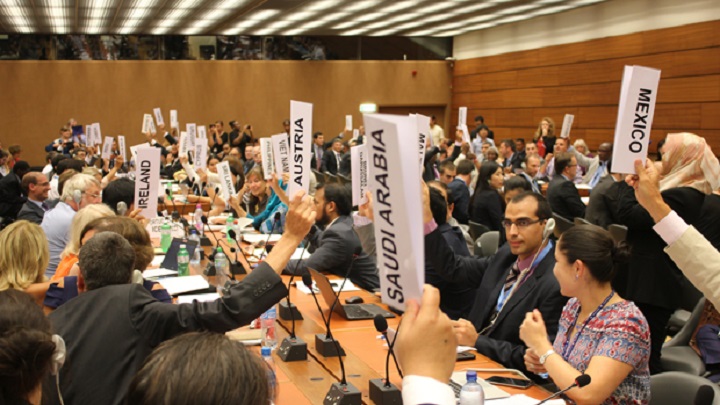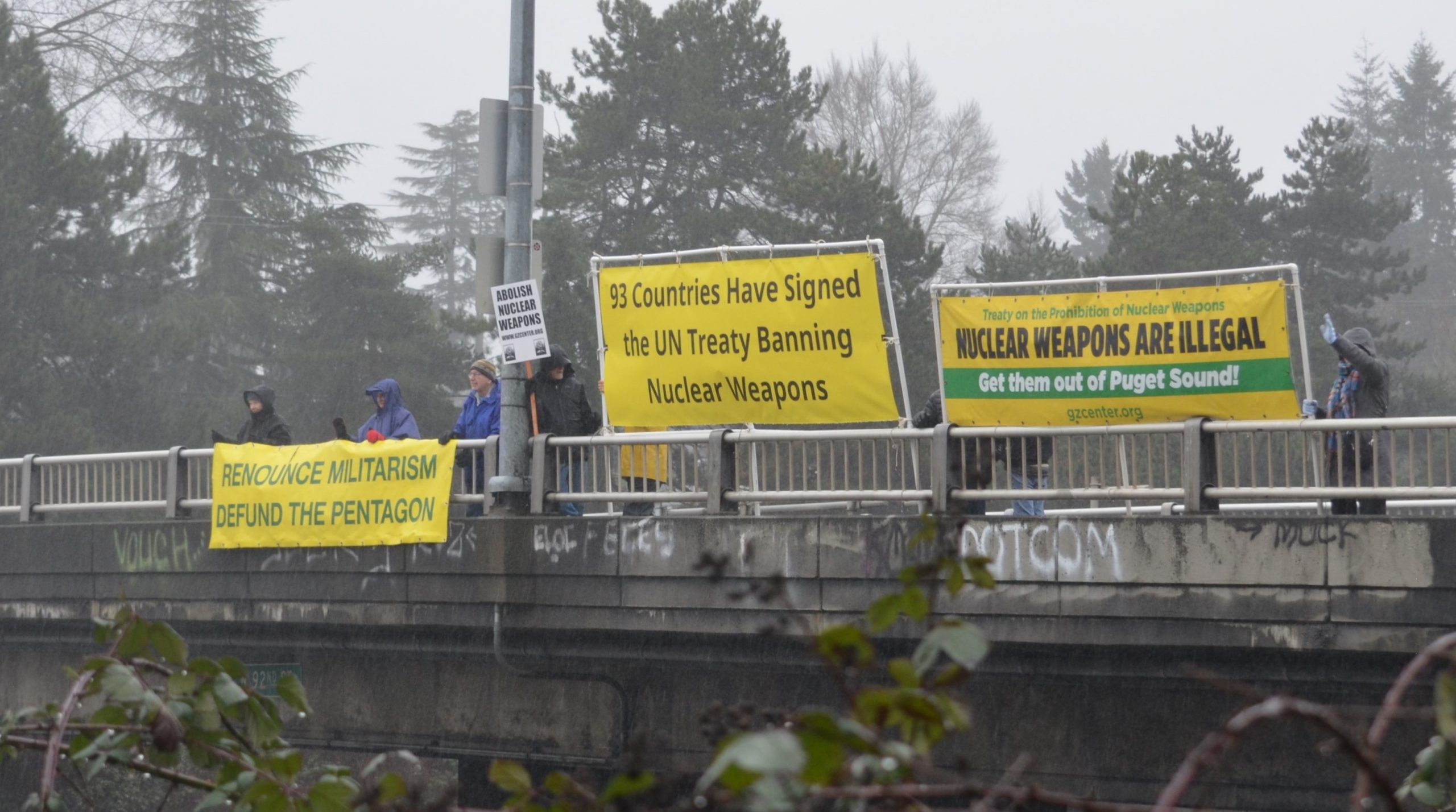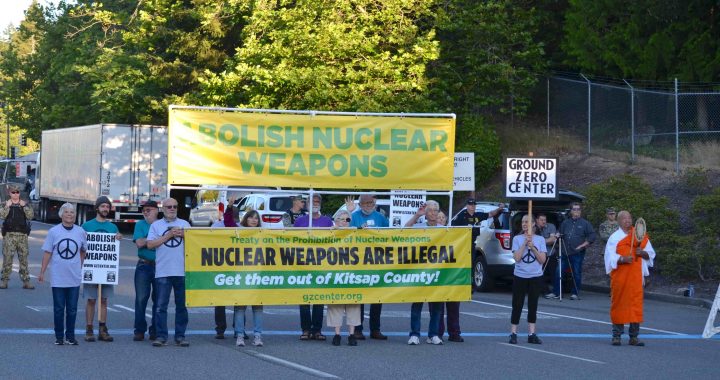By Leonard Eiger & Glen Milner
January 28, 2024
The Treaty on the Prohibition of Nuclear Weapons (TPNW) went into effect three years ago (on January 22, 2021) making nuclear weapons illegal under international law for the first time in history.
The TPNW is the first legally binding international agreement to comprehensively prohibit nuclear weapons, with the goal of leading towards their total elimination. It specifically prohibits countries from producing, testing, acquiring, possessing or stockpiling nuclear weapons. It also outlaws the transfer of the weapons and forbids signatories from allowing any nuclear explosive device to be stationed, installed or deployed in their territory.
On July 7, 2017, a majority of countries (122) voted to pass the TPNW. Since then 97 countries have signed the treaty, and 70 have ratified, becoming states parties and therefore bound by its rules. Conspicuously missing are the nine nuclear-armed countries!

On July 7, 2017 France, the United Kingdom and the United States issued a joint statement clearly stating that they “do not intend to sign, ratify or ever become party to” the treaty that was passed by a majority of countries that same day. It is unconscionable that any country claiming to uphold the intention and rule of international law and the United Nations Charter would refuse to support one of the most important treaties in modern history.
Of course flaunting international law is business as usual for the nuclear-armed countries. The U.S. – which is the only nation to have used nuclear weapons against another – has blatantly disregarded international law on countless occasions, most recently in its unfettered support for Israel in its illegal and genocidal campaign against the Palestinian people.
On January 22, 2024, the anniversary of the TPNW’s entry into force, people across the U.S. and around the world stood up in unified voice to raise awareness of the importance of the treaty at a time when the danger of nuclear war is higher than it has been for generations.
Here, in Seattle, Washington, activists stood with multiple banners on the N 92nd St. I-5 overpass facing incoming traffic to Seattle on the Interstate 5 freeway, and reaching thousands of drivers. The banners made people aware that nuclear weapons are illegal, and one of the banners called on people to renounce militarism.
On January 7th, the Kitsap Sun newspaper published An Appeal to Navy Personnel, paid for by Ground Zero Center for Nonviolent Action, and calling on our brothers and sisters in the Navy to “Refuse to engage in nuclear annihilation!” The appeal is a sincere plea for the people who are responsible for launching nuclear weapons to consider the consequences of their actions along with their moral and legal responsibilities.
On January 13th, members of the Resist US-Led War Movement and Ground Zero Center for Nonviolent Action joined together for a demonstration against nuclear weapons at the Bangor nuclear submarine base in Silverdale, Washington. The thermonuclear warheads (carried on Trident II D5 ballistic missiles) deployed on submarines based at Naval Base Kitsap-Bangor comprise the largest concentration of deployed nuclear weapons in the world.
History has shown time and time again that the possession of nuclear weapons has failed to “deter” aggression by “potential adversaries.” It is a dangerous illusion to believe the Pentagon’s official position that “Nuclear deterrence is the bedrock of U.S. national security.”
From the Cuban Missile Crisis to Russia’s war on Ukraine, deterrence continues to fail, and only cooler heads have prevented the unthinkable to occur, which would mean the deaths of millions of people, the end of civilization as we know it, and perhaps even the end of (at least human) life on Earth.
Furthermore, the nine nuclear-armed countries continue to push back against the wishes of the vast majority of countries that are calling for disarmament, calling it an unrealistic, utopian vision that can never be achieved. As Ray Acheson, Director of Reaching Critical Will, states, “Disarmament comes to be construed as a utopian vision of a world that cannot exist because, as the argument goes, some people will always want to retain or develop the capacity to wield massive, unfathomable levels of violence over others” (from Banning the Bomb: Smashing the Patriarchy, Page 31).
This global order, controlled by the nuclear-armed countries, that allows certain “rational actors” to possess nuclear weapons, “is guided above all else by ‘deeply and profoundly internalized prejudices about the global distribution of reason and trust’” (Banning the Bomb, Page 40). The nuclear-armed countries would have us believe that we can trust no one, putting to rest any discussion of “mutual interdependence and cooperation” (and ultimately disarmament).

Bannering over Interstate 5, Seattle on January 22, 2024. Photo by Glen Milner.
Ironically, the goals of the TPNW really are possible. Nuclear weapons have always been exorbitantly expensive, and the financial costs and risks are becoming greater and greater, particularly in a new and growing arms race. Even more importantly, they are useless as weapons of war; they are omnicidal. Once used in warfare, humanity can never go back to business as usual, assuming there will be anything left. This is what is so compelling about the TPNW. With the implementation of international treaties and especially a significant treaty like the TPNW, with a means to verify compliance, countries can begin to develop trust for a new international order.
We will need to develop a new level of trust (in one another) in order to collectively address this and other existential issues like climate change and pandemics. Moving forward with the TPNW, and bringing the nuclear armed countries on board, will serve to eliminate the threat of nuclear weapons while building a sense of trust between countries—which is desperately needed to solve other serious problems. And the cuts in nuclear weapons expenditures can be used on the other pressing issues.
It is time for countries and civil society to rise up to help the United Nations fulfill its original intention (as stated in the preamble to the United Nations Charter:
- to save succeeding generations from the scourge of war, which twice in our lifetime has brought untold sorrow to mankind, and
- to reaffirm faith in fundamental human rights, in the dignity and worth of the human person, in the equal rights of men and women and of nations large and small, and
- to establish conditions under which justice and respect for the obligations arising from treaties and other sources of international law can be maintained, and
- to promote social progress and better standards of life in larger freedom,
AND FOR THESE ENDS
- to practice tolerance and live together in peace with one another as good neighbors, and
- to unite our strength to maintain international peace and security, and
- to ensure, by the acceptance of principles and the institution of methods, that armed force shall not be used, save in the common interest, and
- to employ international machinery for the promotion of the economic and social advancement of all peoples,
The nuclear-armed countries collectively possess roughly 12,500 nuclear weapons, more than enough to extinguish life on Earth. Rather than wasting our collective human and economic resources on our own demise, shouldn’t we be coming together to solve the problems we have created and build a just, sustainable world for the sake of future generations?
Why would a nuclear-armed country sign on to the TPNW? For self-preservation, knowing that threats involving the use of nuclear weapons cannot go on indefinitely until these horrific weapons are used. Nuclear-armed countries know that they will be decimated in a nuclear exchange. And these same countries are expending enormous amounts of resources (technology and funds) only to ensure their (and our) own death sentence.
In his remarks to the Tenth Review Conference of the Parties to the Treaty on the Non-Proliferation of Nuclear Weapons in 2022, United Nations Secretary General António Guterres spoke to the urgency of nuclear disarmament:
“The clouds that parted following the end of the Cold War are gathering once more. We have been extraordinarily lucky so far. But luck is not a strategy. Nor is it a shield from geopolitical tensions boiling over into nuclear conflict. Today, humanity is just one misunderstanding, one miscalculation away from nuclear annihilation. We need the Treaty on Non-Proliferation of Nuclear Weapons as much as ever.”
Secretary General Guterres finished his remarks by saying:
“Future generations are counting on your commitment to step back from the abyss. We have a shared obligation to leave the world a better, safer place than we found it. This is our moment to meet this basic test, and lift the cloud of nuclear annihilation, once and for all.”
On January 24th the Bulletin of Atomic Scientists announced that the Doomsday Clock would remain at “90 seconds to midnight, still the closest the Clock has ever been to midnight, reflecting the continued state of unprecedented danger the world faces.” Arguably, the Clock could have been set even closer to midnight, indicating the ever-worsening situation faced by humanity, first and foremost the continued threat of use of nuclear weapons. The clock is ticking as we continue to move toward the abyss!
We, as global citizens must demand that our leaders take action to step back from the abyss, embrace that shared obligation, work to build mutual understanding and trust, and remove the threat of nuclear annihilation once and for all. Future generations will either thank us, or those who might survive the initial effects of an inevitable and horrific nuclear war will curse us for our folly.
This is no pipe dream, no utopian vision, no naive proposal. It is quite simply a matter of life or death – the end of life as we know it.
What will we choose?
NOTES:
Leonard Eiger is an anti-nuclear weapons activist and a member of Ground Zero Center for Nonviolent Action.
Glen Milner is an anti-nuclear weapons activist and a researcher with the Ground Zero Center for Nonviolent Action since 1984.




